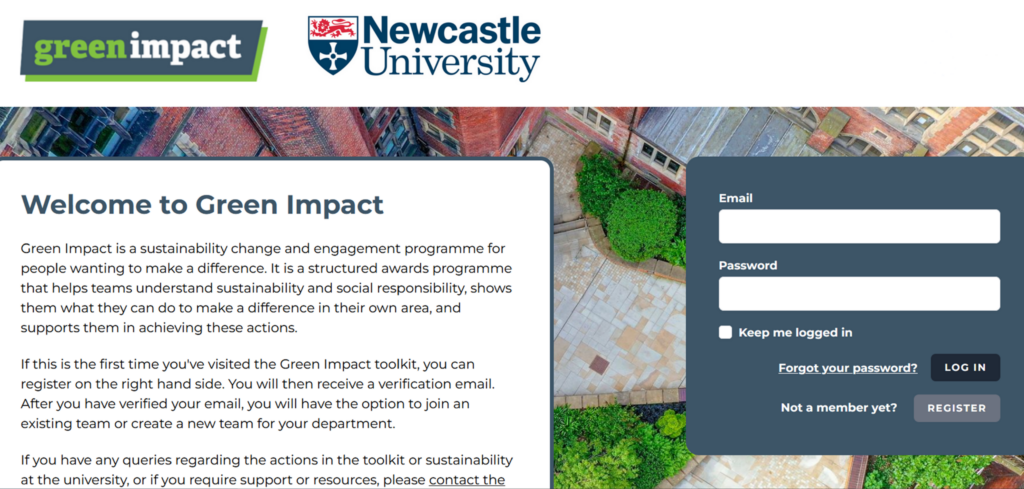Green Impact is a UNESCO award-winning programme tailored towards promoting socially and environmentally sustainable practices across a wide range of organisations, including public sector bodies such as our university. The programme, run by SOS-UK, works with colleagues (organised into teams) to foster sustainable action in line with the UN’s Sustainable Development Goals (SDGs) and we in the Sustainability Team have been working hard to launch a bespoke version for Newcastle University! So, if you want to get involved with the University’s crucial net zero by 2030 target and help reduce energy use, water use, waste and more, read on!

How does it work?
Green Impact is designed to be easy to set up and get stuck into and SOS-UK have even launched a new online toolkit for the programme to let you intuitively track your progress, compare your teams scores (only if you want!), and see your next targets.
There are 5 steps to Green Impact’s timeline of sustainable action:
- Sign up to Green Impact online.
- Chat to your colleagues about Green Impact teams in your work area and either join one that’s already been created or create your own (feel free to give the team a fun name!).
- Work through your assigned actions. Each action grants a certain number of points which then stack up towards the Bronze, Silver, and Gold action awards (50, 100, and 150 points respectively)!
- Our friendly student auditors will come round to check your progress in mid-May.
- An awards ceremony will be held in June, featuring engraved slates (recycled!) for teams that made it to Bronze, Silver, or Gold, and certificates for everyone who took part!
Why should you join?
- Create meaningful sustainable change in your workplace: the work you and your team do will help to limit energy and water use, boost environmentally responsible planning of workplace projects, improve reuse and reduce waste, save budgets, and more! In other words, your efforts will actively contribute to sustainable development and Net Zero progress at Newcastle University. Additionally, you’ll find you can apply some Green Impact actions to your personal life too if you want to help save on bills and further reduce your environmental impact.
- Improve your knowledge and skills on pressing environmental issues: Green Impact offers workshops and skills development opportunities to provide insights and understanding on sustainability and social and environmental justice!
- Meet like-minded colleagues and boost your teamworking skills: the programme is highly collaborative and social with the joint effort required to complete actions and plenty of chances to network with environmentally conscious colleagues from across the University.
- Collect your awards! Your sustainability work will be recognised at the Celebrating Success: Environment Awards in June!
Key dates
There’s a range of exciting events and dates coming up! Plus, keep an ear out for the further activities and sessions we’ll organise throughout via our Sustainability Network newsletter.
- Green Impact session at Experience Week (come along for updates, news, and further information!): 11th March, 10-11am.
- Deadline for actions (complete as much as possible before this!): 17th May
- Celebrating Success: Environment Awards: June.
- Join: right now! Or whenever you feel like it – the signup process is easy, just follow this link.

